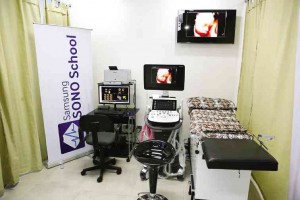A sound partnership for training

FROM left: Cho, Tordesillas, De Guia-Fuerte, Capito and Chung Lyong Lee, president and managing director of Samsung Electronics Philippines
The country’s premier public teaching/training hospital, the 103-year-old Philippine General Hospital (PGH) will be the local showcase for Samsung Electronics’ venture into the lucrative medical equipment business.
The giant South Korean conglomerate, until recently known primarily for home appliances and mobile communication gadgets, inaugurated last month Samsung Sono School at PGH Department of Obstetrics and Gynecology (OB-Gyne).
Samsung provided four brand-new and state-of-the-art sonography machines to be used by the department for diagnosis of patients and for training medical practitioners already in this medical field or who want to specialize in the high-technology area.
Sonography, more popularly known as ultrasound imaging, is the use of high-frequency sound to examine internal body parts. Sound waves create images of internal organs, including fetuses inside the womb, making the technology an almost indispensable tool for OB-Gyne departments of hospitals.
PGH will be the first in the country to try out Samsung’s latest product. The new machines are expected to help significantly reduce the high number of deaths from pregnancy and childbirth.
Article continues after this advertisementMDG unachievable
Article continues after this advertisementThe most recent estimate of maternal mortality or death rate in the Philippines is 160 per 100,000 live births, too high to enable the country to achieve the Millennium Development Goal 5 (MDG 5) of 55-60 deaths by 2015. In fact, the more optimistic forecasts have the country reducing the maternal mortality rate to only 140 per 100,000 by 2015.
In his speech during the hand-over ceremonies, Cho Soo-in, president of Samsung’s Health and Medical Equipment Business, said the project was a collaborative effort of his company and PGH, which he described as “the most historic” and “the largest training hospital in the country.”
“Through this partnership, we hope to be able to make a real contribution toward affordable, accessible and enhanced prenatal care for Filipino mothers who are in need and are suffering from health issues,” Cho said.
He said the Philippines “is a huge country with almost 100 million population. Its birth rate is among the highest in Asia, about three children per woman. To make this country more healthy, the government and medical society have been making massive commitments in health-care programs.”
In a project overview, Samsung said it chose PGH because it felt the need was greatest at the hospital as it is “the largest public hospital in the country in terms of bed capacity [with] around 95 percent of the 600,000-800,000 patients annually being charity cases.”
It is also attached to and operated by the University of the Philippines Manila, “whose faculty are considered extremely competent, well-respected and influential” in the local medical community.
The OB-Gyne faculty members will be conducting the training over three years as provided for in the donation agreement with Samsung.

SAMSUNG sonography machines in Sono School will be used to train not just Philippine General Hospital staff but other medical people. Eugene Araneta
Model for others
Dr. Gregorio T. Alvior, chair of PGH Medical Foundation Inc. (PGHMFI), said the new school was expected to provide a wide range of training not just for the hospital’s personnel but also for people from other parts of the country. He said the first Samsung medical project in the country could serve as “a model for similar projects.”
Dr. Lourdes Capito, PGH deputy director, hailed the inauguration of Sono School as “a celebration of learning and service.” She said PGH had always struggled to keep up with medical technology advances so Samsung’s donation was very welcome.
The technology would allow the hospital to provide its patients with the “highest care and service possible, which they deserve,” she said.
PGHMFI president Dr. Edward Tordesillas said the project would benefit trainees from both PGH and other government institutions and also strengthen the hospital’s research functions.
With Samsung providing administrative support and funds for training activities, Dr. Blanca de Guia-Fuerte, chair of the OB-Gyne department, said the new school would help PGH improve its medical service.
She said that by providing training to medical practitioners in the complex field of sonography, the hospital hoped to make a more significant contribution to improving the national health situation.
Monthly training
Chief OB-Gyne resident physician Dr. Myka Martinez said Sono School would train obstetrician-gynecologists and general practitioners in the basic use of ultrasound to help reduce maternal illnesses and deaths to reach the MDG 5. Initially, she said, medical students would not be among the trainees.
PGH, she said, planned to conduct the two-day training workshop every month, with each class consisting of 25 participants.
A minimal fee will be charged to cover the cost of electricity, snacks, modules, etc.
According to a statement from Samsung, the sonography training course aims to help upgrade medical manpower, particularly in countries where primary care for pregnant women is often inadequate.
Samsung provides ultrasonic diagnostic equipment for classrooms set up through partnerships with hospitals, universities and medical associations, allowing not just instruction on theory but practical exercise.
Through Sono School, Samsung hopes to help reduce not only maternal but fetal death rates as well through early diagnosis of potential problems.
Consequently, the company hopes to attract potential customers who will train using its medical equipment.
It envisions an improved training curriculum from the OB-Gyne department that will cover both practical and theoretical aspects of the Basic Ultrasound Training inasmuch as the UP-PGH’s counterpart input into the project is training.
Trainees are expected to receive credits for Continuing Medical Education (CME) from PGH.